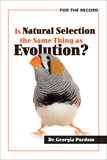Cod Evolution No-Go
Another example of “evolution in action”—need we even bother examining the reality to confirm this isn’t what Darwin predicted?
News Source
- The Boston Globe: “Cod in the Act of Evolution”
Time and time again, we encounter reports of an animal evolving “right before our very eyes.” So far, every time we’ve dug into the details, it turns out the scientists and reporters are—knowingly or unknowingly—pulling a bait and switch. While the headlines suggest animals are “evolving” in such a way that supports molecules-to-man evolution (i.e., Darwinian evolution), the facts merely show how natural selection can reduce the genetic information in a given animal population—the opposite of Darwinian evolution.
That brings us to Boston Globe coverage of cod evolution. Taking a closer look at one aspect of a report we covered last month, correspondent Murray Carpenter announces,
Evolution still brings to mind the kind of change that happens over millions of years, such as humans evolving from forerunners of apes. But there is increasing evidence that species can evolve quite quickly, within our lifetimes, and that human intervention in the natural world is speeding up that process.
Again, the implication is that the “evolution” we observe in nature is the same as broader “evolution” over millions of years. Yet the same word is being defined differently in the two instances.
In this case, the cod fish’s “evolution” fits decisively within the creation paradigm; in fact, it could serve as a textbook example of the workings of natural selection. Carpenter explains, “Decades of intense fishing for the largest cod have meant the species has evolved along the lines of the survivors, which is to say, smaller cod.” Large cod are nowadays “especially rare.”
The Proceedings of the National Academy of Sciences report that Carpenter cites showed that not only cod fish size, but also the sizes of 28 other “commercially harvested plants and animals,” had changed in response to human harvesting at a rate three times faster than what occurs in nature.
Carpenter also reports that cod fish size does not appear to be recovering from the effects of human harvesting, even in protected habitats. According to Douglas Swain of Fisheries and Oceans Canada, “This result supports the hypothesis that there have been genetic changes in growth in this population in response to size-selective fishing.” If there are no more large cod to be found, that would mark a loss of genetic information—not a gain, as would have been required for molecules-to-man evolution.
In the article’s conclusion, however, Carpenter quotes the University of Maine’s Michael Kinnison, one of the authors of the PNAS paper. “It would be nice to change that public perception so that folks really understand that evolution is an everyday process . . . going on around us all the time.” We agree—if only folks would likewise understand that this “evolution” we observe is, in fact, the exact opposite of fish turning into philosophers over millions of years.
Further Reading
- Hasn’t Evolution Been Proven True?
- Natural Selection vs. Evolution
- Is Natural Selection the Same Thing as Evolution?
- Get Answers: Information Theory, Natural Selection
For More Information: Get Answers
Remember, if you see a news story that might merit some attention, let us know about it! (Note: if the story originates from the Associated Press, FOX News, MSNBC, the New York Times, or another major national media outlet, we will most likely have already heard about it.) And thanks to all of our readers who have submitted great news tips to us. If you didn’t catch all the latest News to Know, why not take a look to see what you’ve missed?
(Please note that links will take you directly to the source. Answers in Genesis is not responsible for content on the websites to which we refer. For more information, please see our Privacy Policy.)
Recommended Resources

Answers in Genesis is an apologetics ministry, dedicated to helping Christians defend their faith and proclaim the good news of Jesus Christ.
- Customer Service 800.778.3390
- Available Monday–Friday | 9 AM–5 PM ET
- © 2026 Answers in Genesis







